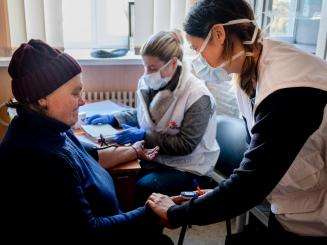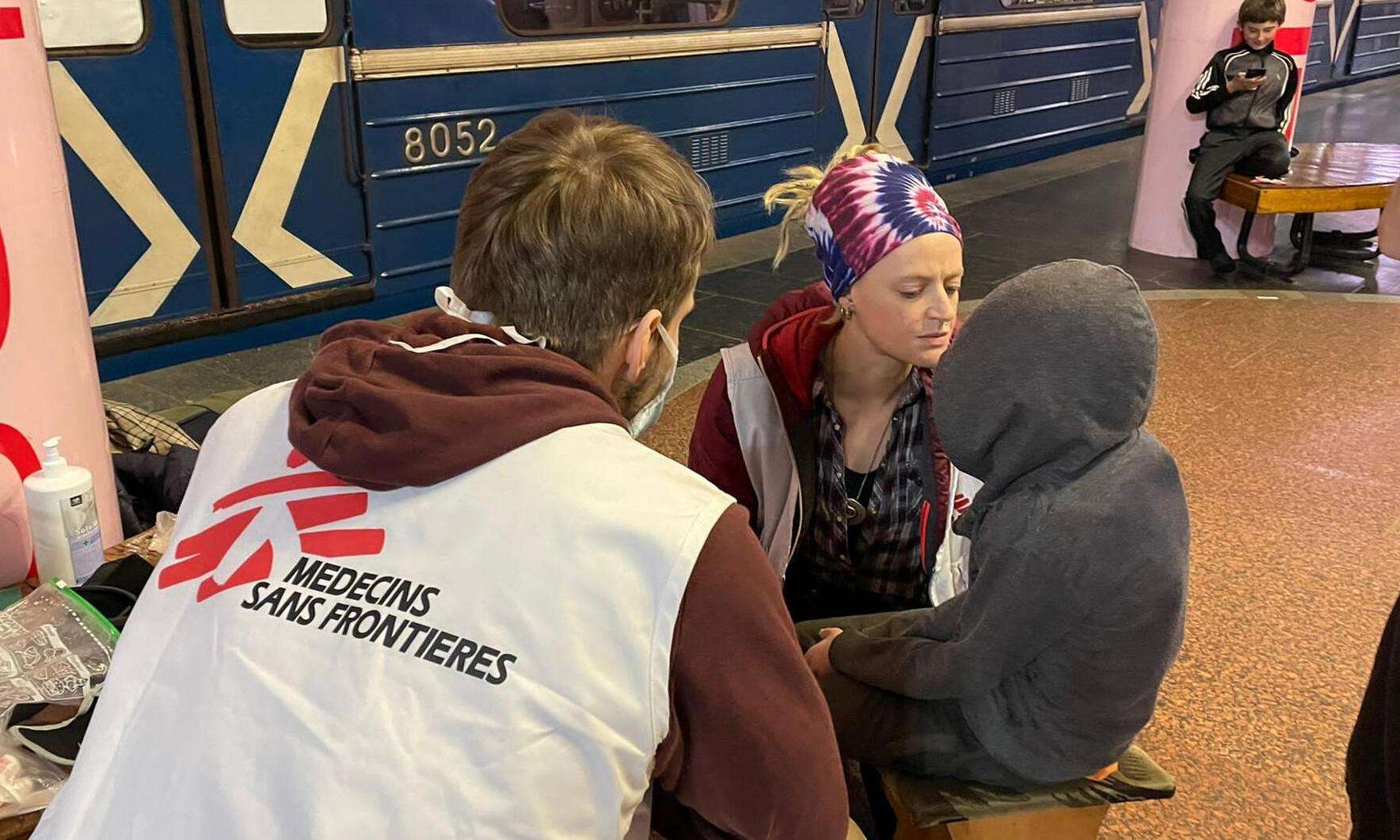Over the course of the past year, Doctors Without Borders/Médecins Sans Frontières (MSF) teams in Kharkiv, Ukraine, supported displaced people and others without access to health care, reconstructed health care facilities, trained health care staff, and donated medical supplies to hospitals.
As the war escalated in February 2022, many residents of the Kharkiv region—including medical staff—fled to western Ukraine or left the country. Many people in rural villages and towns in the region fled into the city, seeking shelter in underground metro stations. The loss of health care workers, coupled with the massive medical needs related to the war, soon pushed the health care system to the brink.
From March 2022 to March 2023 MSF teams in the Kharkiv region provided:
health care consultations
individual mental health counseling sessions and 166 group sessions
health practitioners were offered psychological support
In response, MSF emergency teams began supporting health care facilities with donations and provided medical consultations to displaced people in Kharkiv. Many who took refuge in the city’s metro stations were also coping with the loss of their family members, friends, homes, and plans for the future. Our teams set up mobile clinics to provide psychological first aid.
In cases where MSF couldn’t reach people cut off from aid, teams made donations—such as fuel, food boxes, hygiene kits, including toothpaste and soap—to local organizations, civil society groups, and volunteers who could immediately support those most in need. These partnerships allowed MSF to help far more people than would have been otherwise possible.
Reaching areas cut off from health care
In early September, as the Ukrainian army retook vast areas of the Kharkiv region, MSF teams ran mobile clinics in areas now under Ukrainian control to reach people who had been cut off from aid, often for months. At times, MSF teams were the first to meet people who remained isolated in the villages and towns of Kharkiv region during the fighting.
“We saw that near the front lines, access to health care was almost nonexistent,” said MSF Head of Mission Natalia Torrent Martinez. “When we arrived at these retaken areas, we tried to identify how the provision of health care had operated in the past. Our aim was to support the health care system so it could get back up and running, while providing psychological first aid and primary health care to those most in need."
Being able to work near the front lines was an essential part of supporting people who had remained in these areas.
April 29 04:26 PM
Ukraine: "Some people are too scared to surface at all"
MSF doctor Lisa Searle writes about her experience caring for displaced people in Kharkiv’s metro stations.
Read More
“People lived for months isolated and excluded from the outside world. Imagine that suddenly a group of people show up in your village, to bear witness to your suffering and to support you,” said Martinez. “The mere presence of our teams meant a lot to people who, in some cases, had endured the worst year of their lives.”
In most of the villages and towns where MSF teams worked, health care workers had left, health facilities had been destroyed or looted, and people couldn’t get the medicine they needed for new or chronic conditions. The teams would set-up clinics on the street or in bus stops or town halls—frequently with the help of the residents themselves.
“When the head [of the village] said that Doctors Without Borders are coming to see us, but because the medical clinic is damaged there is nowhere for them to set up, I said ’How can there be no place? We have private houses that have survived,’” said Lyudmila Karatsyuba, 67, a resident of Novy Burluk in the Kharkiv region. “I have four rooms, two are for the family, and it’s warm in the yard. Will we not accept those who come to help us?”
“Without thinking, I said that I will receive people in my house. And as the weather was already getting cold, I vacated the rooms— so that the doctors would be comfortable and warm— and heated the wood stove in the summer kitchen. We prepared tea, lunch, and even cooked pumpkin porridge [for them].”
December 02 04:26 PM
Ukraine: The toll of war on the elderly and people with disabilities
MSF mobile clinics respond to urgent needs.
Read More
The hospitality of the people MSF assists makes emergency humanitarian aid possible and provides the teams and patients with a safe place to work. While providing care in Lyudmila’s home, the teams also worked on fixing the damaged clinic in the village.
“I am grateful to everyone involved and to those who did not leave such a remote village in such a difficult time and [instead] supported it,” said Lyudmila. “Now they are already accepting [patients] in the medical clinic, as it has been rebuilt.”
The war’s devastating impact on mental health
Many patients are struggling, not only with the loss of family members and neighbors, but also with the loss of the life they knew. Most of the patients MSF has supported in the past year are over the age of 60. As the fighting continues, it takes a toll on people’s mental health.
“Many of the people we have met are retired and, after years of building what they have, suddenly their lives have been completely turned upside down,” said Martinez.
The impact of the war on mental health is and will continue to be one the main challenges for the health care system in Ukraine, as the needs have grown immensely. However, stigma surrounding mental health has decreased and mental health support has become more normalized.
Although new organizations are coming to Kharkiv and the local health care system is slowly regaining its capacity, the people living in the region—especially those close to the front lines—continue to endure hardships and challenges when it comes to accessing health care. MSF continues to adapt its approach in the Kharkiv region, where teams are monitoring the situation and intervening where needed, including in the neighboring region of Poltava, which hosts large numbers of displaced people.





